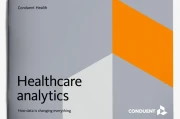Alright, let's dive into this Conduent (CNDT situation. The headline is al...
2025-11-08 9 conduent
Ten million.
Let that number sink in for a moment. It’s more than the entire population of New York City. It’s a figure so vast it almost loses meaning, becoming an abstract statistic. But behind that number are ten million individual lives—names, addresses, Social Security numbers, and deeply personal health information—now stolen and adrift in the digital ether. The data breach at Conduent, a massive government services contractor, isn’t just another headline in the endless cycle of cyberattacks. It's a verdict. It’s a damning indictment of a system we’ve built, a system where the digital blueprints of our lives are handed over to the lowest bidder.
This isn't a story about clever hackers or a sophisticated zero-day exploit. This is a story about trust, and the catastrophic consequences when that trust is broken not with a bang, but with the silent, undetected hum of servers exfiltrating data for months on end. We’ve outsourced the very plumbing of our society—Medicaid, child support, food assistance—to corporate giants, believing in their promises of efficiency and security. What happens when the pipes burst?
Let’s be brutally clear about the timeline here, because it’s where the story moves from unfortunate incident to unforgivable negligence. The attackers gained access to Conduent’s network on October 21, 2024. They weren’t discovered and evicted until January 13, 2025. That’s nearly three months. Eighty-four days. Hackers didn't just smash a window and grab what they could; they moved in. They unpacked their bags, mapped out the neighborhood, and methodically began shipping out the crown jewels of American personal data—we’re talking 8.5 terabytes of it, according to the ransomware group Safepay that claimed responsibility.
Imagine an IT administrator, somewhere in a sterile server room, finally noticing an anomaly in the logs. The blinking cursor on the screen must have felt like a punch to the gut, the slow-dawning horror that you haven’t just been robbed, you’ve been occupied. This wasn't just a brief intrusion that exploited a single vulnerability; it was a full-scale colonization of a digital territory that holds the keys to millions of American lives, and the fact that it went unnoticed for so long is a catastrophic failure of imagination and execution.
The attackers engaged in what’s called data exfiltration—in simpler terms, they weren't just looking, they were copying and stealing massive files containing our most sensitive information. For 4 million people in Texas alone, this included Social Security numbers and private medical details. This is the kind of data that can be used to construct a parallel life, to open lines of credit, to file fraudulent tax returns, or to blackmail individuals. It’s the permanent, unchangeable core of our identity. And for twelve weeks, it was flowing out of Conduent’s servers like a river. The most terrifying question isn’t just how they got in. It’s why on earth did nobody notice they were there?

The breach itself is a disaster. But what came next is, in my opinion, the true scandal. In its notification letters to the ten million victims, Conduent offered a masterclass in corporate detachment. The letter confirms the theft of names, Social Security numbers, and health data. It notifies law enforcement. And then, it delivers the real message: you’re on your own.
Conduent is not providing the affected people with free identity theft protection services, a fact confirmed by news reports (10 Million Impacted by Conduent Data Breach).
When I first read that sentence, I honestly had to read it again. It’s an abdication of responsibility so profound it borders on the surreal. This isn’t a small startup that can’t afford the cost; this is a company that reported $754 million in revenue in a single quarter. They spent a reported $2 million on responding to the event—a rounding error. To then turn to the ten million people whose lives they’ve put at risk and essentially say, “You should probably check your credit report,” is beyond insufficient. It’s an insult.
This is where my analogy comes in. Imagine a company is hired to build and manage a massive dam that holds back a reservoir of sensitive information for an entire region. The company cuts corners, the dam cracks, and a flood of personal data wipes out the digital lives of millions downstream. In response, the company sends a letter saying, "We have notified the authorities about the flood. We encourage you to buy your own buckets and sandbags." That is precisely what Conduent has done.
We have to ask ourselves a fundamental question: what is the duty of care for a private company that functions as a quasi-governmental entity? Conduent isn't just selling widgets; it supports 100 million Americans across 46 states, disbursing billions in government payments. When a company profits from managing the machinery of the state, does it not inherit a higher, more profound responsibility to the citizens it serves? Or is the public just another line item on a balance sheet, a risk to be managed with carefully worded legal notices?
This breach is more than a headline; it’s a breaking point. It is the klaxon sounding in the night, warning us that the model is broken. We can’t continue to outsource critical public infrastructure to monolithic entities without demanding a radically new level of transparency and accountability. This isn’t about better firewalls or more complex passwords; it’s about a fundamental shift in how we view data. Personal data is not a commodity. It is an extension of our identity, and it must be treated with the sanctity it deserves. This event must be the catalyst for a new Digital Social Contract, one where any organization, public or private, that holds our essential data is bound by law to a fiduciary duty of care—with severe, unavoidable penalties for failure. The price of convenience can no longer be our security.
Tags: conduent
Related Articles

Alright, let's dive into this Conduent (CNDT situation. The headline is al...
2025-11-08 9 conduent